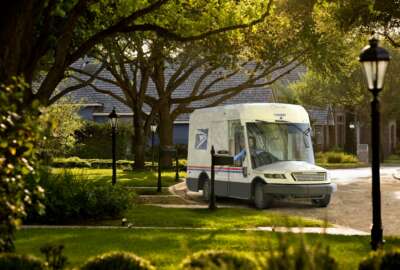

Postal Service and Justice Department attorneys are asking a federal court to dismiss an electric vehicle company's bid protest over USPS's next-generation deli...
Postal Service and Justice Department attorneys are asking a federal court to dismiss an electric vehicle company’s bid protest over USPS’s next-generation delivery vehicle contract, on the grounds that the vendor failed to exhaust all of its administrative appeal options before filing the bid protest in June.
The Workhorse Group told the U.S. Court of Federal Claims last month said it spent six years and more than $6 million designing a prototype next-generation delivery vehicle for USPS, but was unfairly disqualified from consideration in the more than $3 billion vehicle contract.
Attorneys for Oshkosh Defense, the USPS vehicle award recipient, went one step further in the motion to dismiss it filed Monday, saying both its electric and fossil fuel-powered prototypes were more cost-effective and “technically superior” to the prototype vehicles submitted by other contractors.

Oshkosh Defense’s attorneys said USPS ranked Workhorse’s electric battery-powered design last, both in terms of technical ranking — the most important criteria in making the award — and in terms of best value.
In contrast to Workhorse’s all-electric approach, Oshkosh told the court it “proposed a more flexible approach that utilized an internal-combustion-engine vehicle in the near term with the option to transition to an electric vehicle in the medium to long term.”
Workhorse, in its bid protest over the contract award, said USPS “put its thumb on the scale against Workhorse” and took their prototype out of consideration over a “safety incident” caused by a USPS test track driver’s error.
Workhorse also alleges Oshkosh Defense, the USPS vehicle award recipient, submitted a prototype vehicle “entirely different” than the one selected for production, and that the winning design from Oshkosh “skipped the prototype phase altogether.”
Rather than debate the merits of the USPS contract award, DoJ attorneys urged the court to throw out Workhorse’s bid protest because it “failed to exhaust applicable administrative remedies.”
After USPS awarded the contract to Oshkosh, DoJ attorneys said Workhorse sent a disagreement letter to USPS’ contracting officer, who then “issued a detailed response letter denying Workhorse’s disagreement.”
If Workhorse was unsatisfied with the contracting officer’s decision, DoJ attorneys said it could have filed a complaint with the Supplier Disagreement Resolution Official, but DoJ said the vendor didn’t do that.
“Workhorse has indisputably failed to exhaust administrative remedies required by application Postal Service regulations. As a result, the court must dismiss this case,” DoJ attorneys wrote.
Attorneys for Oshkosh Defense said that rather than appeal to the SDR official, Workhorse “sat idle for three months” before moving forward with its bid protest.
“In the face of such a delay, Workhorse cannot plausibly claim that judicial review was so urgent that it could not participate in USPS’s mandatory dispute resolution procedure before its SDR Official— a process which is designed to take approximately 30 days to complete,” attorneys wrote.
President Joe Biden, setting an ambitious goal in the first month of his administration, signed an executive order directing all agencies, including the Postal Service, to move the entire federal vehicle fleet to electric and zero-emission vehicles. USPS makes up more than a third of the total federal fleet.
Postmaster General Louis DeJoy initially told Congress that only 10% of its new fleet would be electric vehicles, but later told lawmakers that figure was “a floor — not a ceiling — based upon our current financial situation.”
Postmaster General Louis DeJoy told lawmakers electric vehicles will be more expensive to purchase than those that run on fossil fuels, and will require additional spending to build charging stations, Workhorse said the Postal Service’s private-sector competitors are “aggressively moving toward all-electric, zero-emissions fleets” to save money.
Copyright © 2024 Federal News Network. All rights reserved. This website is not intended for users located within the European Economic Area.
Jory Heckman is a reporter at Federal News Network covering U.S. Postal Service, IRS, big data and technology issues.
Follow @jheckmanWFED


